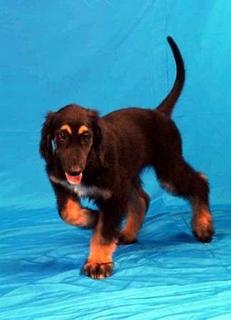
S.Korean scientists create world's first cloned dog
By Jon Herskovitz
Wed Aug 3, 1:18 PM ET
SEOUL (Reuters) - Man can now reproduce his best friend -- South Korean scientists announced on Wednesday they had created the world's first cloned dog.
Woo-Suk Hwang and his team of researchers at Seoul National University made world headlines earlier this year when they created stem cells with a patient's specific genetic material, derived through cloned embryos.
Now they have cemented their place as leaders in the field by creating Snuppy, the first dog cloned from adult cells by somatic nuclear cell transfer. This is the same technique used to create Dolly, the world's first cloned mammal, and other animals.
Hwang said the breakthrough in cloning dogs may advance work on combating diseases by therapeutic cloning with stem cells.
"Our research goal is to produce cloned dogs for (studying) the disease models, not only for humans, but also for animals," Hwang told a press conference.
Snuppy, short for Seoul National University puppy, where Hwang's lab is located, is a male born by caesarean section weighing 530 grams on April 24 after a normal, full-term pregnancy in a yellow Labrador surrogate mother.
The second puppy, NT-2, weighed in at 550 grams but died 22 days later from pneumonia. A post-mortem exam showed there were no anatomical problems with the dog that died.
A total of 1,095 reconstructed embryos were transferred into 123 surrogates to create the two dogs -- an efficiency rate of 1.6 percent.
Both puppies were created from an adult skin cell taken from a male Afghan hound using somatic cell nuclear transfer. Sheep, mice, cows, goats, pigs, rabbits, cats, a mule and horse have been cloned in the same way.
The Afghan breed was selected mainly for its size and striking appearance, researchers said.
"The purpose of this research is to produce research animals, not domestic pets," the research team said in a statement.
They said the difficulty in producing dog clones "underscores the importance of responsible regulation of this vital science."
CANINE DIFFICULTY
The scientists believe the ability to clone dogs will help to determine environmental and genetic contributions to traits of different breeds and could also help preserve rare species.
Scientist Gerald Schatten, who participated in the study, said cloning dogs may help scientists study diseases that affect dogs as well as humans such as cancer and diabetes. Therapeutic stem cell techniques for diseases could be tested in dogs and then used to treat humans, he said.
"By learning whether it is safe and effective in our (pet) companions, we may also know whether it is safe and effective for our loved ones", said Schatten, a medical researcher at the University of Pittsburgh.
Therapeutic cloning involves creating embryos for a supply of stem cells to be used for research or therapy to develop cures diseases ranging from diabetes to Parkinson. Stem cells are master cells that can be coaxed to develop in any cell tissue type in the body.
It has taken scientists longer to clone a dog than other animals because of the difficulty in producing mature, unfertilised canine eggs in the laboratory.
Unlike other mammals, dog eggs are released earlier from the ovary than in other species. Instead of maturing the eggs in the lab, the researchers overcame the problem by collecting mature eggs from the dogs.
Their achievement is reported in the science journal Nature.
The egg's genetic material was removed and replaced with the nucleus of the skin cell from a male Afghan hound, then fused to create an embryo, which was implanted into a surrogate mother at the correct time to coincide with the embryo development.
Some scientists cautioned there are many unresolved ethical questions about where the science may lead.
"Techniques that advance our understanding of diseases and their therapy are to be encouraged but cloning of animals raises many ethical and moral issues that have still to be properly debated within the profession," Freda Scott-Park, President-Elect of the British Veterinary Association said in a statement.





No comments:
Post a Comment